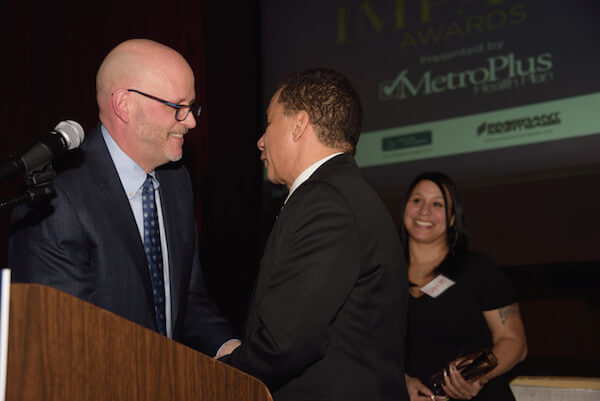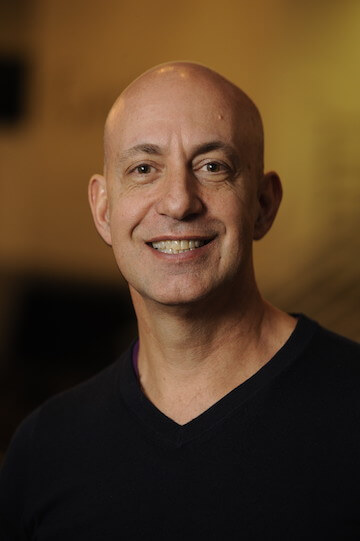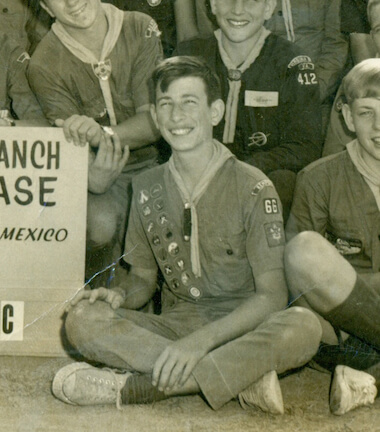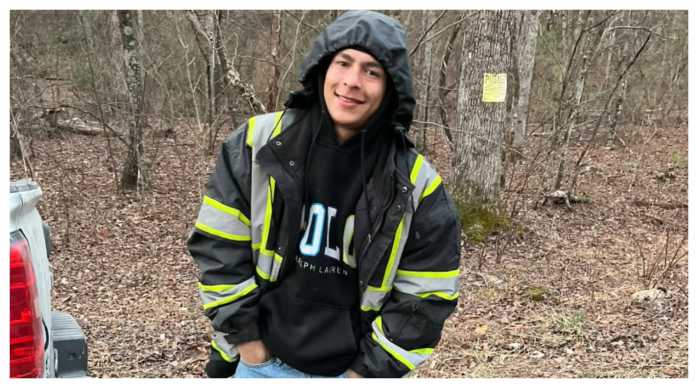A publicity shot of Bob as a young comic and author. | COURTESY OF COURT STROUD
A poster with a large color picture of Bob Smith stood on the landing as guests headed downstairs at Carolines. “Sorry for your loss” from the staffer was followed by the realization that, damn, Bob Smith was a good-looking guy.
Smith, 59, died after a 10-year, full-tilt battle with ALS, long known as Lou Gehrig’s Disease, on January 20. Media reports noted that he was the first out gay comedian to appear on “The Tonight Show” and reported on his career, from solo comedy to his appearances with Funny Gay Males to his TV writing, his novels and books of essays, and the many other accomplishments he managed to cram into an overfull, too-short life.
The crowd that filled Carolines was there to remember all these things, but even more so the man, the partner, the friend, the father, the brother, the supportive colleague, and the Nature Boy. Since Smith’s chosen family included many top-notch creatives, the celebration was beautifully produced, paced, curated and had excellent production values. The performers worked hard to keep from crying, but they also “killed,” the term comics use for delivering a great set.
Family, friends, colleagues, fans, caregivers flock to Bob Smith’s finale at Carolines
The show was organized and hosted by Smith's surviving partner Michael Zam, Judy Gold, Eddie Sarfaty, and Court Stroud, all close friends of Smith’s.
“Finally, Bob is headlining at Carolines,” Gold began.
Sarfaty, who’d replaced Smith in Funny Gay Males, and was his roommate when Bob received his ALS diagnosis, spoke of the emails, calls, and texts he’d been getting: some from friends and colleagues and others from people who’d never met Smith, but wanted to tell how he’d changed their lives with his comedy and writing.
The remaining Funny Gay Males, Jaffe Cohen and Danny McWilliams, took to the stage to reminisce about their partner. They talked about the language of their own they’d developed as they worked together: catch phrases, looks that meant everything, long-running jokes that continued even after Smith lost the ability to speak and expressed himself through spelling into people’s hands and using his iPad.
“He had a love of comedy that transcended everything,” Cohen said.
The reminiscences were interspersed throughout with clips from Smith’s appearances and sketches he wrote for “MADtv.”
Nora Burns and Frank DeCaro talked about spending time with Smith as his disease progressed, as others slipped away. Burns came to see him when he was in rehab, and at his apartment, and talked to him and read to him… from Smith’s books.
They introduced several short videos from other comics and friends, including Steve Hasley, Kristen Becker, Erin Foley, and Andre Kelly, who promised Smith he would do “everything in my power to take that orange motherfucker down.”
Gold reminisced about her long friendship with Smith, leaving the crowd giggling and hooting with stories from when they met in Provincetown, and she realized he was “the most generous comic I ever met,” to stories of how Smith was a much-beloved Funny Uncle to her two sons.
Musician Glenn Rosenblum gently mocked Smith’s lack of a “musical comedy gene,” then told of how Smith called him up and asked if he’d ever really listened to “There’s No Business Like Show Business.” They talked about what the song meant, and how true it is. Rosenblum then played and sang a sweet, slow version of the Irving Berlin classic.
Much was made of Smith’s love for animals, especially his dogs, and one of the non-pros who spoke was Michael Shapiro, Smith’s neighbor, who often watched Bob’s dogs (both rescues) when he was away or unable to take care of them. Shapiro and his wife Susan became friends with Smith, and the neighbor concluded with, “Bob’s journey was awesome.”
Many people knew that Smith had fathered two children for his great friend Elvira Kurt and her wife, Chloe Brushwood Rose, referring to himself as a “deadbeat donor.”
“Our kids are the most immense gift Bob could give anyone,” Rose said.
Kurt then took the mic for a riveting, heartbreaking, funny remembrance that recalled Smith’s voice, “which I miss so much,” and the many milestones they’d shared. “Bob never let himself sit in the pain. And he didn’t have to die to be liked that well.”
As Smith lost his voice, he turned more to writing fiction and memoir, completing three novels and an essay collection before his death, and became a member of an informal group of writers who called themselves ASS (Authors Secret Society), which met to have cocktails, discuss their work, and encourage each other. The members of ASS each chose a short selection of Smith’s work to read.
James Hannaham, who read from “Openly Bob” noted that “Bob Smith is the only comedian I can think of who killed at his funeral.”
John W. Bateman came up from Mississippi to read a section from “Way to Go, Smith,” while Patrick Ryan chose a passage from “Selfish & Perverse.” Mitchell Carroll, Christopher Bram, and Chris Shirley all read pieces from “Treehab,” Smith’s collection of essays about his love of nature and learning to live with what he called his “you’re gonna die-agnosis.”
Stroud, who met Smith and Sarfaty on a cruise (and ended up marrying Sarfaty), read a short piece from “Walking My Dog through the Valley of the Shadow of Death is a Nice Way to Start the Day.”
Bob Smith, at a 2010 benefit for the Stonewall Democratic Club of New York City, wielding the oven mitts that were a running joke with his friend and fellow comedian Eddie Sarfaty. | JON NALLEY
Sarfaty shared his own memories, arriving onstage wearing a pair of oven mitts… another long-running joke he and Smith shared. Sarfaty recalled how Smith thought about having Eddie do his bits when he was no longer able to do standup. “…and then I’m the guy who’s stealing jokes from the guy who’s dying of ALS?”
Sarfaty talked about how Smith eventually needed the help of full-time aides, Pierre and Larry, who grew to love him. Sarfaty and Smith’s other friend made it a point not to sanctify him: they recalled how stubborn he was, how messy, how bad he was with money. But it was Smith’s stubbornness that helped keep him going for so long, Sarfaty said. He accompanied Smith on long bus rides to Boston, where Smith tried without success to get into clinical trials for experimental ALS treatments.
They traveled overseas in search of the latest treatments, and even when they were turned down or not able to find what they needed they took the time to see what there was to see in Israel, Turkey, and other places.
“Bob didn’t beat ALS,” Sarfaty said. “But I’m sure ALS is really sorry it fucked with Bob Smith.”
Some of Smith’s “Nature Boys” — John Arnold, Michael Hart, Sarfaty, and Zam — read from his “Treehab” collection and talked about how much the natural world meant to Smith, and how much he hated the people who despoiled and exploited the Earth. Dick Cheney was a villain in one of Smith’s books, and the Koch Brothers were in his story “Coal in Your Stocking,” a reinvention of “A Christmas Carol.”
Zam then took to the stage to talk about his life with Smith. They’d just begun their relationship when Smith was diagnosed, and together they figured out how to deal with it as the disease progressed, from workarounds like having power strips on the floor that Smith could use to turn things on when his hands grew too weak. “Adapting kept our lives going for a long time.”
Eventually, Smith couldn’t manage the steps in their apartment, and had to move to a more accessible facility. Zam’s writing career took off: he authored the book of an Off-Broadway musical (“The Kid”), and with Jaffe Cohen was nominated for an Emmy for his writing on the miniseries “Feud.”
“I would never in a million years take any of it back, even one day,” Zam said.
The celebration wouldn’t have been complete without a musical number, and Broadway stars Ann Harada and Caitlin Kelly were joined by Sarfaty, Stroud, and Eric Kornfeld, accompanied by Jono Mainelli, for a version of “Mame,” customized for Bob Smith. It was funny, a little risqué, and sung with heart and passion.
Gold and Sarfaty thanked the audience for coming, and gave way to a final audio and video: a recording of a call from Jay Leno, who reached out to Smith toward the end of his illness, and then Smith’s entire “Tonight Show” debut.
It was a hit, a star-making performance: funny, on-target, flawless. Bob Smith was a handsome man, a very good man, and a great comic.
Editor's note: Musician Glenn Rosenblum was misidentified by the first name Ben in the original posting of this story.




































